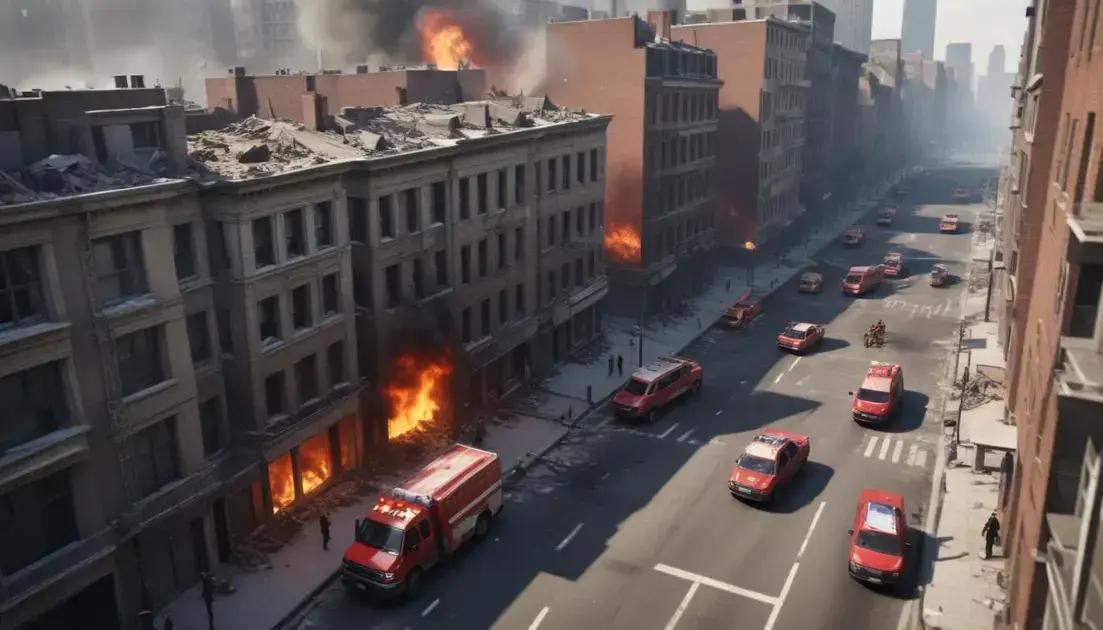
Mumbai Attacks: Urban Terrorism and Global Networks
Urban terrorism significantly impacts international security by prompting nations to enhance cooperation, sharing intelligence and resources to combat potential threats. Major attacks create immediate shifts in travel patterns and public perception, leading to increased security funding and stricter measures. Understanding the implications of urban attacks helps cities and countries develop strategies that prioritize safety and preparedness.
Mumbai Attacks shook the world and raised critical questions about urban security. How can cities protect themselves from such devastating threats? Let’s delve into the complexities of urban terrorism and its global ramifications.
The coordinated attacks in Mumbai
The coordinated attacks in Mumbai in 2008 changed how we view urban safety. These attacks targeted key locations, including hotels and a train station. They occurred over several hours, leaving a lasting impact on the city.
During the attacks, terrorists used firearms and explosives. They caused chaos and fear among residents and visitors alike. The quick response from security forces was crucial in minimizing the loss of life.
Many people were trapped and traumatized. Witnesses shared harrowing stories of fleeing under fire. The media coverage brought the urgency of urban terrorism to the forefront.
These events revealed vulnerabilities in city security systems. It sparked worldwide discussions on how to prevent such occurrences. Increased surveillance and better emergency response plans became vital topics.
Following the attacks, nations reviewed their security policies. Cities learned from Mumbai’s tragedy to strengthen their defenses against terror. More focus on intelligence sharing and collaboration among nations became necessary.
Understanding the methods used in Mumbai helps authorities create effective strategies. Cities now aim to prepare and protect inhabitants from any future threats. The events in Mumbai remain a powerful reminder of the importance of urban security.
Global implications of urban terrorism
The global implications of urban terrorism extend far beyond local borders. When terror strikes a city, it sends ripples throughout the world. These events can change international relations, impacting trade and travel.
Countries must work together to fight this threat. Sharing intelligence is crucial for preventing attacks. Collaborative efforts can help track terrorist movements and identify potential risks.
Urban terrorism often leads to increased security measures globally. Airports, public venues, and city infrastructures may see heightened checks. This impacts how people travel and gather in public spaces.
Additionally, communities become more vigilant and aware. Ordinary citizens might feel the need to report suspicious activities. This active participation can create a stronger, safer environment.
Media coverage plays a huge role as well. News outlets often cover these events extensively, raising awareness. The fear created can influence public opinion and even prompt government action.
Moreover, urban terrorism can spark debates on human rights and security. Balancing safety with personal freedoms is a delicate act. Societies must navigate these challenges to ensure both protection and liberty.
In summary, urban terrorism doesn’t just affect the city in which it occurs. Its global implications require a united response from all nations to effectively combat this pressing issue.
Case studies of urban attacks
Case studies of urban attacks help us understand the nature of these incidents better. They show how different cities responded and what lessons were learned. Each case adds valuable insight into urban security.
One well-known example is the 2015 Paris attacks. Terrorists struck several locations, including theaters and cafes. The aftermath revealed gaps in emergency response and preparedness.
Another important case is the 2016 Nice attack. A truck was used to ram into a crowd celebrating Bastille Day. This incident led to increased awareness of using vehicles as weapons.
In London, the 2017 Westminster attack highlighted the challenges of protecting crowded spaces. An attacker used a vehicle to target pedestrians before entering the Parliament grounds.
These examples emphasize that urban attacks can happen in any city. They showcase the importance of quick, effective response strategies. Cities must prepare by having clear plans and trained personnel.
Additionally, analyzing these case studies can aid in improving public safety measures. Understanding the attackers’ motives and methods is crucial for prevention. It helps cities to enhance their security protocols.
Overall, learning from past urban attacks shapes the future of city security. Each incident provides a new perspective on what needs improvement and how to protect citizens.
Preventive measures against terrorism
Preventive measures against terrorism are essential for keeping urban areas safe. Cities must take steps to protect their residents from potential attacks. Understanding risks and being proactive can make a big difference.
One important measure is enhancing security infrastructure. This includes installing surveillance cameras in public places. Monitoring crowds helps identify suspicious activities quickly.
Community involvement is also crucial. Residents should be encouraged to report any weird behavior. Awareness programs can teach people what to look for and how to respond.
Training law enforcement is another key strategy. Officers need to know how to handle emergencies effectively. Regular drills and exercises can prepare them for various scenarios.
International collaboration plays a big role too. Nations must share intelligence about possible threats. This teamwork helps create a united front against terrorism.
Lastly, fostering social cohesion in communities can reduce extremism. Programs that promote understanding and harmony can help counteract radicalization. Building strong ties among residents creates a more united society.
Overall, a combination of security measures and community efforts can help prevent terrorism. By working together, cities can enhance safety and protect their citizens from threats.
Impact on international security
The impact on international security due to urban terrorism is significant. When a major city faces a terror attack, it shakes the whole world. Nations recognize that terrorism is a global issue, not just a local one.
Many countries reevaluate their security measures after an attack. They improve their military strategies and enhance intelligence sharing. This cooperation helps track down potential threats before they strike.
The fear caused by urban terrorism also affects travel. People may become hesitant to visit cities known for such incidents. This can hurt local economies and tourism.
Additionally, governments often increase funding for security services. More resources go toward anti-terrorism programs and training. This ensures that security personnel are better prepared for any threats.
Urban attacks can also change international relations. Countries may strengthen alliances, focusing on joint security efforts. This unity helps create more effective responses to terrorism.
Public opinion can shift due to fear. Citizens may demand stronger action from their governments. This push for increased security measures can lead to changes in laws and policies.
Overall, urban terrorism significantly influences international security. It leads to collaborative efforts and changes in how nations protect their citizens.
Conclusion
In conclusion, understanding the impact of urban terrorism on our cities is crucial. The lessons learned from major attacks shape our security measures and response strategies. By studying these events, we can improve safety and protect our communities more effectively.
International cooperation plays a vital role in combating terrorism. When countries share information and resources, we create a stronger defense against potential threats. This unity helps safeguard us all.
Moreover, raising community awareness is essential. Every citizen can contribute to security by being vigilant and reporting suspicious activities. Together, we can foster a sense of safety in our crowded urban spaces.
Ultimately, by prioritizing preventive measures and working together, we can reduce the risk of urban attacks. This collaborative effort not only strengthens our cities but also enhances peace around the world.


